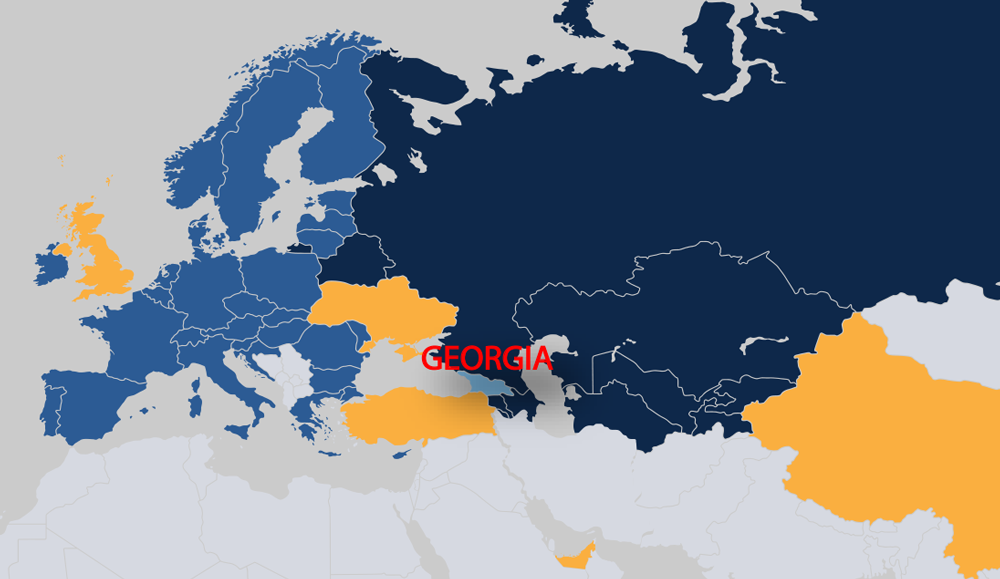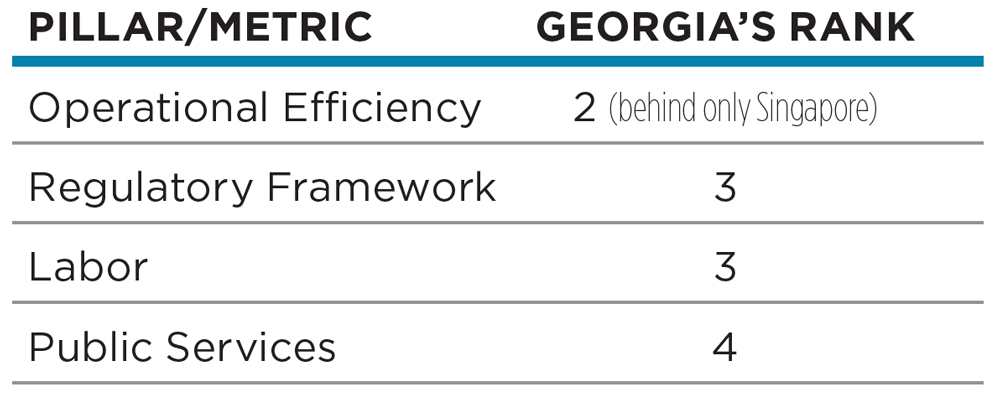In March, John Pearson, CEO of DHL Express, and Prof. Steven A. Altman of the NYU Stern School of Business (lead author of the DHL Trade Atlas), shared in-depth analysis of global trade and regional connectedness as part of their ongoing research that tracks countries by both speed and scale of trade growth. With a growth rate of 13%, the country of Georgia, their data predicts, will be No. 3 in the world over the next five years when measured by speed of global trade volume growth.
After seeing 8% growth in trade volume (a $7.4 billion rise, good for a No. 16 ranking) between 2019 and 2024 fueled by such sectors as minerals, automotive, food & beverage and wine and by exports to neighboring countries as well as China and the United States, Georgia will see $19.1 billion worth of trade volume growth between 2024 and 2029, the Atlas projects.
It’s a figure approaching the country’s total trade value of $23.6 billion in 2024. But it’s not an unexpected leap in a growing country.
“Over the past four years we have had around a 10% growth rate,” says Mr. Mikheil Khidureli, CEO of Invest in Georgia. “We emerged very strong since 2021 and have maintained that trajectory. Exports, investment and tourism are all growing.”
Entrepreneurs On the Rise
So are startups.
In the 2025 Global Startup Ecosystem Report released in June by Startup Genome in partnership with the Global Entrepreneurship Network, Dealroom, Crunchbase, Pitchbook, Bella Private Markets and Tracxn, Avtandil Kasradze, chairman of Georgia’s Innovation and Technology Agency (GITA), said, “We’re transforming Georgia into a regional innovation hub through global partnerships, a 0% tax regime, strong infrastructure and accessible funding, offering one of the region’s most startup-friendly environments.”
GITA is launching four full-scale accelerators annually starting in 2025, mentoring 160 startups each year. Proposed tax incentives, says the report, include a 10-year tax break for innovative startups: 0% for the first three years, 5% for the next three and 10% for the final four. Incentives include 300% tax credits for innovative SMEs engaged in qualified R&D and 30% cashback opportunities on R&D expenses. International IT companies benefit from a 5% tax rate.
The report’s analysis noted the following:
“Georgia is rapidly emerging as the region’s leading innovation and startup ecosystem through improved infrastructure, expanded tech parks and strong engagement from local and international stakeholders. The country boasts a modern tech infrastructure with nine technology parks, including one in Tbilisi [a metro area with a population of 1.2 million]. A 10th tech hub is under development in Kutaisi and is set to become the largest in the country, strengthening the position of the Georgian ecosystem globally.”
A new initiative, StartUP in Georgia, includes two pillars: international events and a digital one-stop-shop platform offering key programs, news and opportunities. A dedicated StartUP in Georgia digital platform will launch soon, complementing such stakeholders as the angel network Axel, the 500 Eurasia Accelerator (which has mentored 88 startups since 2021) and the $20 million 500 Eurasia VC Fund. Moreover, this year Georgia is launching its first International Innovation Hub in San Francisco, which will serve as a physical space connecting ecosystems, supporting startups and driving innovation, investment and global partnerships.

Blue on this map indicates collective free trade agreements Georgia has with regions such as the EU, EFTA and CIS. Bilateral FTAs exist with countries in orange, including the UK, Turkey and China.
Among the sectors driving entrepreneurial growth in Georgia is artificial intelligence. The Georgian government in 2024 launched a National AI Strategy in order to drive AI adoption across sectors. The strategy includes the establishment of Excellence Centers to drive research innovation and commercialize R&D. Those centers will feature mission-critical infrastructure such as data centers in order to support advanced AI development. Other prominent sectors expected to see startup and innovation impact include biotech (driven by institutions like the 100-year-old Eliava Institute and its work in bacteriophage research) and agritech.
IT is another prominent sector. The Startup Genome report said the country’s attractiveness is enhanced by such factors as STEM and ICT education, including the “Do IT in Georgia” initiative, which has trained up to 15,000 people. “According to Galt & Taggart’s May 2024 report, 11,122 students were enrolled in IT programs across 21 universities in 2023/24,” the ecosystem report stated, “reflecting a growing talent pool aligned with the needs of over 120 international IT companies operating in Georgia.”
Khidureli says a new IT hub is in the works, with incentives to accompany it. The hub that is Georgia itself will be further enhanced by the Black Sea submarine cable project, a 1,155-kilometer-long underwater high-voltage transmission network that will connect the internet and electric power systems of Georgia and Europe.
More Ready Than Ever
Judging by the results of the new Business Ready (B-READY) report released in October 2024 by the World Bank, international companies will find their needs met better in Georgia than nearly anywhere on the planet.
The report measures approximately 1,200 indicators per economy, addressing three pillars — regulatory framework, public services and operational efficiency — via 10 topics that include business location, labor, utility services, taxation and dispute resolution. The newly revamped report’s first installment covers 50 countries around the world, a total that co-author Norman Loayza, director of development economics in the World Bank’s Global Indicators Group, told me would increase to more than 180 economies by 2026. One aspect of B-READY worth noting: The report encompasses actual conditions, not theoretical ones.
“The immediate goal of ‘Business Ready 2024’ is to enable countries to identify exactly where they have the greatest room to improve their business environment,” Loayza says. “Disaggregated scores on topics and pillars are good for this purpose.” Nevertheless, when Site Selection aggregated them anyway and averaged out the scores across the three pillars, Georgia finished at No. 3 among those 50 countries, just behind No. 1 Singapore and No. 2 Estonia, and ahead of such competitors as Hungary, Portugal, the Slovak Republic and Bulgaria.
Hop around the spreadsheets to the business location rubric — which encompasses more than 130 sub-metrics from property transfer standards and land dispute mechanisms to environmental permitting and leasehold restrictions for foreign firms — and you’ll find the top score goes to Georgia, which from 2021 through 2024 has attracted $6.7 billion in foreign direct investment.
Prefer to use the prism of taxation? Here, the sub-metrics range from clarity and transparency to VAT refunds, digital services for taxpayers and audit and dispute procedures. Sort by overall score and Georgia places No. 6 in the world, behind Hong Kong and Singapore but ahead of such top 10 locations as Mexico.
Run through the B-READY metrics and pillars and Georgia’s results are promising in a number of areas:

The country will showcase its global connectivity and business leadership when it hosts the fifth edition of the biennial Tbilisi Silk Road Forum October 22–23, 2025, under the theme “Invest in Connectivity — Grow in Stability.” The gathering will welcome over 2,000 delegates from more than 60 countries, including heads of state, senior government officials, ministers, business executives, international organization leaders and media representatives. “In an era of complex geopolitical shifts and economic transitions,” say event officials, “the Forum serves as a vital platform for dialogue and cooperation on enhancing regional and global connectivity.” (For more information, visit www.tbilisisrf.gov.ge.)
Strategic Gateway
Forum officials note how the country’s infrastructure will only become more instrumental: “Georgia is a pivotal player in the Middle Corridor, the Trans-Caspian International Transport Corridor that links East and West across the South Caucasus,” they state, noting that the Middle Corridor is one of the shortest and most reliable East–West transportation options. “Leveraging robust transport infrastructure, modern logistics networks, and extensive free trade agreements (including with the EU, China, Hong Kong, China, UK, Turkey, EFTA, UAE, CIS), Georgia serves as a strategic gateway for commerce between East and West. Ongoing infrastructure development projects — from port to railways and digital highways — further enhance this role. Georgia has invested significantly in modernizing infrastructure and fostering efficient trade routes.” That includes a new airport coming to Tbilisi that will triple capacity.
Even if tariffs and retaliatory measures come into effect, global trade is projected to keep growing over the next five years, the DHL Trade Atlas report found. As John Pearson expressed it, “Do not underestimate the creativity of buyers and sellers wanting to do business with other people.”
In Georgia, both the data and business leaders’ experience show that creativity and ease of doing business go hand in hand.
This Investment Profile was produced under the auspices of Invest in Georgia, the economic development agency under the Georgia Ministry of Economy and Sustainable Development. For more information, visit www.investingeorgia.org or email Info@enterprise.gov.ge.

